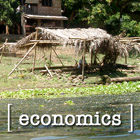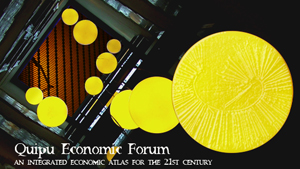
|
CONFLUENCE OF THESE FACTORS DRIVING UNPRECEDENTED CHALLENGE TO INTEGRATED GLOBAL ECONOMY 2 January 2008 2008 will be a year in which the integrity of election processes, the quality and resilience of cultivated soils, the availability of credit to consumers, the affordability of homes and rentals, and access to affordable vital staples like food and water, as well as the cost of transportation, will affect economies the world over. Some economic analysts have said the combination of these factors, resulting instability or environmental degradation, and migration of affected populations, could mean the world is facing an unprecedented level of economic precariousness. 2007 saw prices of commodities, ranging from grains, to metals to petroleum, skyrocket, with mining giants like Río Tinto tripling their stock value, and the price of bread in Mediterranean countries like Spain, jumping 40%. The Earth Policy Institute reports that world grain stocks are at an all-time record low, with only about 54 days of consumption available in case of crop failure or demand-driven scarcity. Drinkable water is also frighteningly scarce, with overpumping of fossil aquifers already beyond sustainable and on the rise. The near sudden widespread failure of lending institutions in the US, dependent on 'sub-prime' mortgages, also known as high-risk loans, and the looming threat of millions of families losing their homes, has contributed to what's being called a global 'credit crunch', in which banks are finding it more difficult to justify loans to individuals and to other banks and governments are looking at taking over some institutions classed as TBTF ('too big to fail'), whose collapse could bankrupt millions in wealthy countries. The credit crunch means the average consumer, now heavily dependent on free-flowing credit, will find far less money available to spend, and economic growth could slow to a halt in credit-dependent markets, like the US and the EU. European governments are said to be bracing for the negative ripple effect of a prolonged recession in the US, starting sometime in 2008, and the US government is working to try to stave off what could be a perfect storm of economic hardship. Recent weeks have seen reports of 'tent cities' springing up outside of New Orleans and in southern California, as increasing numbers of people are priced out of available housing and job security is eroded through decreased credit availability and a nationwide flurry of layoffs. Major banks like Citigroup have seen their stock roughly halved over the last year, and are writing off tens of billions of dollars in losses, and laying off thousands of workers, in what looks to be something between an economic 'correction' and a 'contraction' of capital at the macroeconomic level. To prevent a long-term slide into habitual scarcity and inflated pricing of basic goods, there will have to be a serious burst of courage, research and reason in economic policy. Policy-makers will have to find a way to infuse major financial institutions with sufficient cash to encourage responsible lending and continued growth in capital investment and consumer spending, without devaluing the dollar so substantially that the entire US economy loses buying power abroad. They will have to find a way to encourage businesses to move in new directions, without so decreasing the internal revenue so much that recent massive increasing in federal spending cannot be sustained. Energy policy will need to be re-imagined in fundamental ways to begin to put major economies on course to lead the world to a non-combustible, non-contaminating fuel economy within the next decade, and a greater diversity of resources must be implemented to hold escalating transport costs at bay. Soil quality, and the elasticity of the cultivated environment, the ability of farmed soils to adapt to climatic alterations and to integrate new crops into a healthy life-cycle, will be increasingly crucial to long-term economic stability, as increasing amounts of grain are devoted to bio-ethanol, and as water-scarcity is eased through the international grain trade. 2008 will be the year in which environmental policy, financial markets, farm subsidies and the health of international trade confront a near absolute necessity to come into balance, to prevent further bleeding of economic prosperity across borders. [s] |
||||||||||||||||||||||
|
|||||||||||||||||||||||











